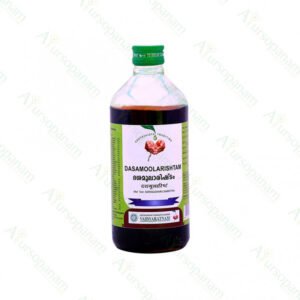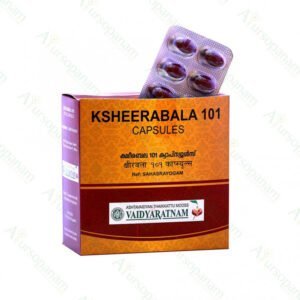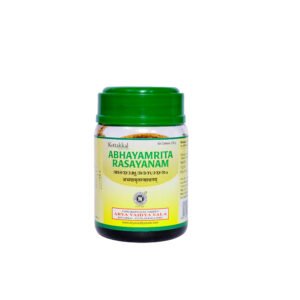Ponkaradi Gulika is an herbo-mineral combination that neutralizes excess acidity in the stomach. It prevents abdominal spasm and flatulence, by encouraging the smooth movement of Vata through the gut.
Gutikas are solid dosage forms in which the therapeutic effects of herbs and roots are concentrated into handy pills. These are conveniently sized and easy to carry around. Ponkaradi Gulika is versatile and can be used to achieve different results through a variety of adjuvants.
Features & Benefits
- Ponkaradi Gulika stimulates appetite. It encourages the release and functioning of digestive enzymes. Relieves indigestion, abdominal gas and flatulence.
- It is an excellent carminative. It pacifies aggravated Vata-Kapha doshas in the gut. Apanavayu the faction of Vata that resides in the Pakwasaya (colon) and deals with the functions of assimilation and excretion, is managed beautifully by this formula. Ponkaradi Gulika prevents acidity, heartburn and malabsorption syndromes.
- It facilitates absorption. It improves bioavailability of food and medicines taken along with it. It promotes balanced nourishment.
- Ponkaradi Gulika also improves gut motility and function. It is a good remedy for irritable bowel and sprue.
- It encourages healthy gut biome and helps in restoring health to the stomach and intestinal mucosa weakened by prolonged periods of inflammation and medication.
Dosage and Instructions
Adult: 1-2 tablets of Ponkaradi Gulika twice daily along with a suitable adjuvant, as advised by the Physician.
Child: 1/2 1 tablet of Ponkaradi Gulika twice daily along with a suitable adjuvant, as advised by the Physician.
Key Ingredients
Tankanam (Borax)
It is an essential element for dietary intake for human and animals. Shuddha Tankana has great therapeutic/medicinal value as a potent expectorant, anti-inflammatory, digestive, diuretic, antimicrobial and is considered as an antidote for Aconite. The present study focuses on the therapeutic value of Tankana in Stree Roga.
Lavana
Commonly known as rock salt, Lavana is good for the eyes, increases appetite and relieves hiccough.
Vacha (Acorus calamus)
Scientifically known as Acorus calamus, Vacha is an ancient herb having various health benefits. The name “Vacha” in Sanskrit means speaking clearly because this herb stimulates intelligence and expression. in Ayurveda, Vacha is known as a rejuvenating herb because of its effect on the nervous system. It is bitter in taste and is used in the dried form.
Hingu (Ferula Asafetida)
Ferula asafetida, also known Hingu , is an Indian spice used for flavoring the food and in herbal medicines for the treatment of digestive and mental ailment. However, flavouring food is not the main concern of hing spice. The main concern of using it in food is to prevent digestive ailment such as gas, flatulence, bloating and abdominal distension.
Lasuna (Allium sativum)
Garlic is a spice known as “Rasona” in Ayurveda. It is a popular ingredient in cooking due to its strong smell and medicinal properties. It is rich in Sulphur compounds that attribute to its various health benefits. Garlic helps to manage weight by improving the metabolism of the body. It is good for heart health as it maintains a balance between good cholesterol and bad cholesterol levels due to its lipid-lowering property. It prevents plaque formation and helps to widen the blood vessels, thereby managing blood pressure due to its antioxidant property. Garlic also helps to boost immunity and increases the ability of the body to fight against various infections.
Shunti(Zingiber Officinalae )
Due to its strong flavour, Ginger is an essential ingredient in many Asian cuisines. Its therapeutic benefits have been recorded in Ayurvedic and Traditional Chinese Medicine. Ginger is a potent anti-nauseatic and is beneficial in treating upset stomach.Gingerol and shogaol, active components of Ginger, suppress gastric contractions. Both the fresh and dried rhizomes of Ginger suppress gastric secretion and reduce vomiting. The compounds 6-gingerol and 6-shogaol have a number of pharmacological properties, including antipyretic, analgesic, antitussive and hypotensive properties.
Jeerakam (Cuminum cyminum)
It is also called Cumin Seeds in English and botanically Cuminum Cyminum is Indian Spice as well as Ayurvedic medicine used for several diseases of the digestive, respiratory, circulatory, and reproductive system.
















































Ratings & Customer Reviews
Reviews
There are no reviews yet.